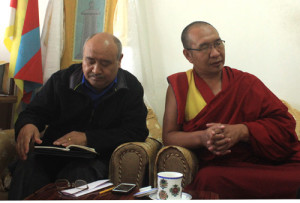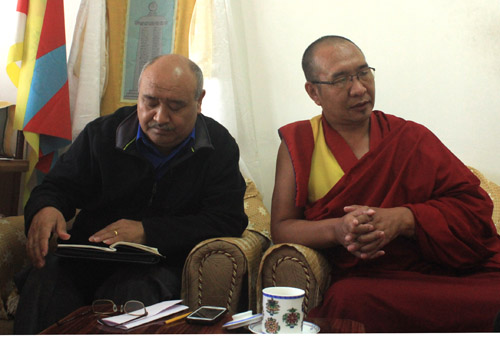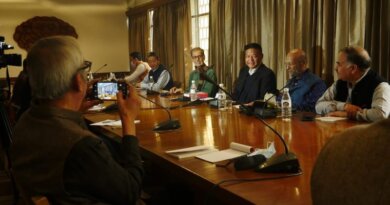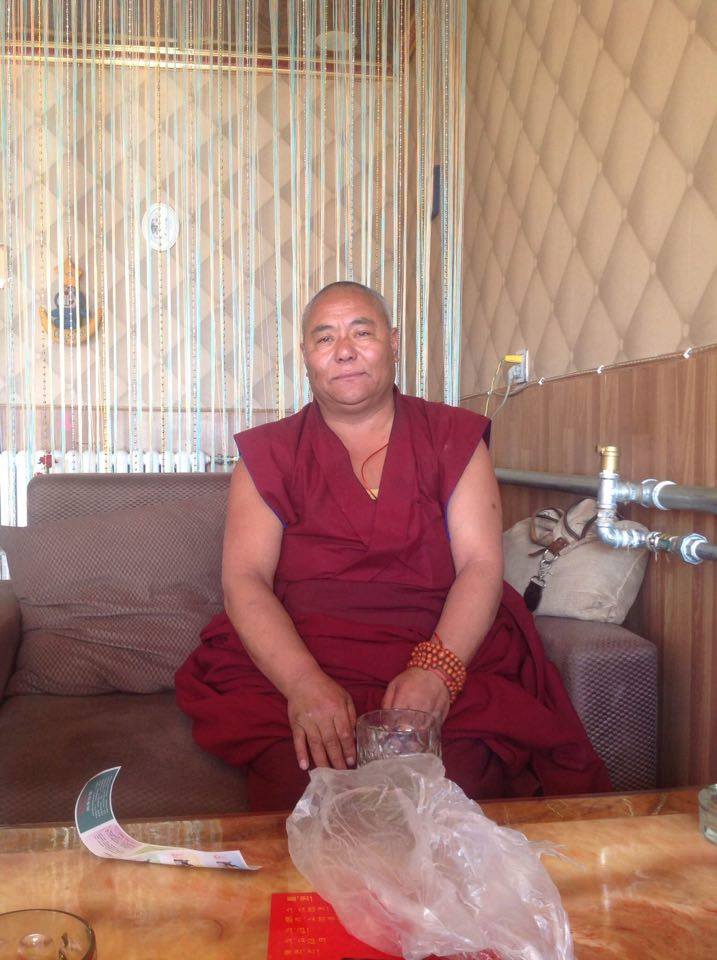Cannot implement all recommendations: Tibetan Election Commission
Tibet Express | October 31, 2015

Tibetans across the globe voted on Oct 18 in the preliminary round of Tibetan elections for Sikyong (Tibetan political leader) and members of the 16th Tibetan Parliament-in-exile. With the post-election process of counting the votes still in process and official results yet to be declared, Tibetan communities located in various pockets of the world are abuzz with the recently held preliminary elections. Some commend the Tibetan Election Commission for successfully conducting the elections while others are critical of the electoral process. Many questions are being raised in the community on the electoral process and discussions on the subject are being advanced by various social media platforms. Tibet Express decided to take some of these pertinent questions to the office of the Central Tibetan Election Commission and seek clarification. Tibet Express spoke with Tibetan Election Commissioner, Sonam Choephel Shosur and Assistant Election Commissioner, Geshe Tenpa Tashi. (Acronyms TE, EC and AEC will be used in the following interview to address Tibet Express, Election Commissioner and Assistant Election Commissioner respectively).
TE : Several Tibet Support Groups have written an open letter addressed to the Sikyong, Kashag (Tibetan Cabinet) and Election Commission raising certain issues pertaining to the Tibetan electoral process. In the said letter, they urged the addressees to ‘make early positive responses to all our concerns’ before the preliminary elections and even stated that their ‘continuing support should not be wholly taken for granted’. Can you please explain what you propose to do?
EC : We have already provided a written clarification to Tibet.net (the official website of the Central Tibetan Administration) yesterday. So you can refer to that as and when they publish it or we can provide you with a copy of the same. (Click here for the clarification)
TE : In the previous election for Kalon Tripa, there were six candidates in the preliminary round and the then Election Commission decided to allow all the six candidates to stand for the final round as the electoral rules and regulations stipulated in the Tibetan charter state that the EC could shortlist a minimum of two to maximum of six candidates to stand for the finals. However, three candidates withdrew their candidacy and the remaining three contested in the final election. What is the reason behind your decision to shortlist only two Sikyong candidates with the highest number of votes to stand for the final election this time?
EC : It is true that all the six candidates were allowed to contest in the final round of the previous election. It is the first direct elections to be held since His Holiness decided to devolve all his political authority to an elected political leader chosen by the Tibetan people. Before His Holiness expressed his wish and decided to devolve his political authority, no amendments were made to the Tibetan charter and the previous election was held before amendments were made to the Tibetan charter in May 2011. As the current election is the first time that the Tibetan people are directly choosing their political leader after the amendments were made and since we must announce at least two candidates according to the electoral rules, we have decided to shortlist only two candidates with the hope that the first political leader directly chosen by the Tibetan people wins with a sizable number of votes and truly represents the wishes of the Tibetan people.
TE : The electoral rules do not bind the Election Commission to make sure that the winner gets a sizable number of votes for it considers the candidate securing the maximum number of votes cast by the Tibetan people as the winner. What do you think is more important?: To make sure that the winner wins with a sizable number of votes by allowing only two candidates to contest for the final or letting the Tibetan people choose the candidates for the final and declare the candidate securing maximum number of votes as the political leader.
EC : Based on the fact that there were three candidates contesting in the final round of the previous election for Kalon Tripa and depending on the results of the preliminary election which represents the wishes of the Tibetan people, we have decided that if the difference in votes between the candidates securing second highest and third highest votes is less than 20%, the third candidate will be allowed to contest in the final round.
TE : We have learned that the Central Election Commission has directed (in writing) to the local Election Commission, Dharamsala to nullify a specific ballot paper for violating the election rules and regulations. We approached the local Election Commission to check the accuracy of the said incident and sought explanation. They answered in the affirmative but refused to provide explanation by saying the Central Election Commission would be in a better position to provide an explanation on the issue.
AEC : In the election rules and regulations, there are around six subsections or conditions under the article describing whether a ballot paper should be considered void and nullified. The first condition says ‘if a voter writes his name or leaves any kind of mark indicating that he has cast that particular vote, it should be counted as an invalid vote’. Therefore, if a person announces that he has cast his vote for such and such person on social media, then it should be considered a violation of the same rule. That is why we decided that the said vote should not be counted as a valid vote.
TE : The reason you gave seems like a different interpretation of the said rule and not what the rule actually says. Because during the final round of the previous election, Gyari Lodi Gyaltsen, then serving as the special envoy of His Holiness the Dalai Lama, announced on Radio Free Asia that he has voted for Tenzin Namgyal Tethong right after casting his vote. Such kind of practices are considered normal and allowed in many democratic countries, including India. The rule that you mentioned specifically mentions that ‘writing voter’s individual name or leaving obvious marks indicating the identity of the voter is a violation and the vote should be considered invalid’. There is no precedence of votes being nullified in such a manner in the previous elections; so do you think it’s the right thing to do? And there are many other Tibetans who have revealed their choice on various social media platforms. Will all those votes be nullified as well?
AEC : It is true that in the rule the phrase ‘circulating photograph of who you have voted on social media such as face book’ is not mentioned but we should understand the purpose of having that rule. It is considered a violation to prevent voters from revealing their identity to others. Therefore, the reason behind nullifying that role is exactly the same as the purpose behind having that particular rule. Several other such cases have been found in other locations and are being dealt with in the same manner. In future too, same action will be taken against such cases.
TE : It is true that it is the responsibility of the Election Commission to safeguard the secrecy of the voter and his choice of candidate. However, since the rule does not specifically mention what should be done if a voter voluntarily wants to reveal his secrecy or who he has voted for on social media, do you think such nullification of vote is in accordance with democracy?
AEC : If describing such acts as violation in the electoral rules and regulations of the Tibetan charter is democratic, then the nullification of such votes is also in accordance with democracy.
TE : According to the electoral rules, all election campaigns must cease 48 hours prior to the Election Day and people were seen pulling down campaign posters from the walls in many locations which is not a new practice in Tibetan elections. However, a day before the election, a very prominent and influential person in the Tibetan community while addressing a huge gathering of Tibetans has stated that ‘tomorrow is the voting day and if you vote for candidates who denigrate His Holiness the Dalai Lama, it’s a disgrace’. A video of that incident is circulating in the social media and its authentic. Does the Tibetan Election Commission treat it as a violation of electoral rules or a special case?
EC : The electoral rules clearly state that candidates and their supporters should cease their election campaign two days before the Election Day. However, the question that you raised does not come under the scope of the electoral rules. It is actually related to the general guidelines of the Election Commission and not the electoral rules per se. Therefore, we cannot recognize it as a violation of the electoral rules.
TE : Will the Election Commission consider it a violation of the rules if a person follows suit in the future and states that people should not vote for such and such person?
EC : If a person specifically mentions an individual’s name and states that the Tibetan people should not vote for that candidate, it is another issue altogether. But if a person does not take a specific candidate’s name and makes general statements such as ‘do not vote for those who defame or vilify His Holiness’ and labels such acts as meaning something, it should be treated as a general opinion. Further, it cannot be said with certainty such incidents will happen in the future.
TE : Tibetans reside in various countries across the world and it is fair to say that our perspectives on many issues differ from the rest of the world. In that light, do you think an influential person making such remarks is in accordance with the principles of democracy?
EC : If such expressions are forbidden, it will be construed as denial of freedom of expression. As such, a person expressing his or her opinion responsibly cannot be considered as undemocratic by the Election Commission.
TE : Irrespective of whether an individual makes a statement or not, let us imagine that there is a candidate whose opinions are considered as vilification of His Holiness? Does a Tibetan voter have the right to cast his vote for such a candidate? And if one casts his vote for such a candidate according to his wish, is it in accordance with democracy?
EC : It is the individual voter’s freedom if he cast his vote as per his wish. It is indeed in accordance with democracy.
TE : A Sikyong candidate has expressed publicly that he would not share the same platform with those who denigrate His Holiness. At Gyurmey monastery in South India, he lauded the monastery’s decision to not allow such persons to speak at the monastery. He has made similar statements at Sera, Drepung and Gadhen monasteries as well. I think such acts are clearly not allowed according to one of the electoral rules. However, I would like to know the Election Commission’s opinion on the issue.
EC : We have certainly provided an explanation on the issue earlier. Section 9 of Article 29 of the electoral rules states that the Election Commission should provide directives on circulation of false propaganda materials during election campaign and we provided our directives accordingly. Since electoral rule pertaining to such kinds of incidents is not clearly stated and it has not been included in our directives, it cannot be recognized as a violation of the rules. Secondly, schools and monasteries have the freedom to make their choice and should be responsible for their decision. As it is not mentioned in the electoral rules, it cannot be considered a violation.
TE : Though institutions have the freedom to grant or deny permission to a certain candidate to speak in their institutions, whether their decision reflects fairness and equality is questionable. But the bone of contention is whether should be considered an incitement and a violation of electoral rules if a candidate publicly states everywhere that denial of space to a person with such and such description is laudable.
EC : Since the candidate is exercising his right to freedom of expression, it is hard for us to recognize it as an outright violation of electoral rules. Therefore, we are unable to point it out as a violation of electoral rules.
TE : According to the Election Commission’s directives regarding campaign expenses, the total campaign expense for a Sikyong candidate should not exceed INR 8 Lacs and the campaign expense for a candidate for the Tibetan Parliament-in-exile should not exceed INR 3 Lacs. But unlike rules laid down in functioning democracies such as our host country India, where disclosure of candidates’ assets and source of income is mandatory before the elections to ensure transparency and legality of the campaign expenses, our candidates are not bound by regulations to disclose their assets and source of income. As such, how effective and pragmatic do you think our directives regarding campaign expenses are?
EC : According to the electoral rules regarding campaign expenses, the Election Commission should provide directives for campaign expenses and accordingly we have set that limit. Since it’s the first time that a campaign expenses’ limit has been laid down, we are not in a position to comment on its effectiveness and practicality or say with confidence that it will be at par with other functioning democracies. We would also like to add that the directive for campaign expenses was passed to raise awareness among the Tibetan people about the importance of transparency of campaign expenses during elections. We did not intend to set it as a standard limit proven though research or science. If we find flaws, it would help us make necessary improvements, which will in turn help the future functioning of the Election Commission.
TE : Earlier, the number of MP candidates shortlisted for the final round of election varied from time to time as the electoral rules state that the number of MP candidates shortlisted from each traditional province ‘should not be less than twice the actual number of seats in the parliament’. In the past, at one time 21 candidates were shortlisted and at another 23 were shortlisted. As People ascribed the discrepancy in the number of shortlisted candidate to whether some candidates were related to the Chief Election Commission or his assistant commissioners, an amendment was made to the rule. The new rule states that the number of shortlisted candidates should be ‘twice’ the number of actual seats, which means only 20 candidates should be shortlisted. Do you think the number of Sikyong candidates to be shortlisted for the final round of election should be similarly standardized as many question the current rule which states that the number ‘should not be less than two and more than six’, leaving much room for different interpretations?
EC : If the Tibetan lawmakers make amendments to the number of Sikyong candidates to be shortlisted for the final round and standardize it as the number of MP candidates to be shortlisted has been done, it would indeed be beneficial as it would make the Election Commission’s work easier and leave no room for unnecessary criticism.
AEC: Since the electoral rule for the number of Sikyong candidates to be shortlisted is not clear, we made the decision to shortlist only two candidates as the rule states that the number should not be less than two. Some Tibetan media have described it as a new rule but the fact is that it is a decision made within the parameters of the same rule and it should be known by everyone. We have also made room for the third candidate if the vote difference between the second and the third candidate is not so huge because we found it important as it reflects people’s choice. However, if there is a huge difference, it doesn’t make sense to include the third candidate in the final round because the inclusion will be reduced to a mere gesture rather than a practical decision as it is impossible for the third candidate to win the election due to various factors such as our population.
TE : Recently some international observers have come to Dharamsala during the preliminary election and presented their findings in a brief report at a press conference. In the report, they noted the uniqueness of our democracy and lauded the electoral process in general. But they also noted that the incumbents such as Sikyong Lobsang Sangay and Speaker Penpa Tsering enjoy a huge advantage in the present electoral process. They also suggested that some of the decisions taken by the Election Commission should have been taken much earlier to ensure fairness and protect the integrity of the Election Commission among the Tibetan public. For example, they suggested that the decision to shortlist only two Sikyong candidates for the final round should have been made before rather than after the preliminary election. What do you think about their recommendations?
EC : We have much to gain rather than lose from their recommendations. Their recommendations will definitely help us make changes to the existing rules and improve our electoral system. However, if we announce the number of candidates to be shortlisted for the final round before the preliminary election, that will naturally have a harmful effect on the voters. They will be left with very little choice in the preliminary election as they may think that they are only two choices. On the contrary, making the announcement after the preliminary gives the voters more options and leaves the control of the preliminary election and its result in the their hands. The observers may have thought that the candidates who openly declared their candidacy are the only candidates in the preliminary election. If that is so, then they are right in making that recommendation. However, the Tibetan electoral rules state that the number of candidates to be shortlisted for the final election should be made after the voters have cast their vote in the preliminary election. Since the responsibility to announce the number candidates to be shortlisted for the final round lies with the Election Commission, it is significant to make the announcement before knowing the results rather than after it because that might be construed as a biased decision.
AEC: Another thing to be clarified is that the observers made recommendations on two issues and the issue that we are talking about is not included in the report presented by the group of observers. It was mentioned in reply to a question raised by a reporter. Probably, you were that reporter? It is his personal opinion and does not represent the opinion of the two organizations as it is not mentioned in their report.
TE : If that is so, in my view it becomes all the more significant because one of the organizations, Asia Democracy Network (ADN) does research and provides recommendations on democracy in general. But the person who made the statement, Mr Ryan D Whelan represents Asia Network for Free Elections (ANFREL) whose work specifically concerns free and fair election. Don’t you think his recommendations are all the more significant to the Election Commission then?
AEC : It is not mentioned in the report. He was replying to a question from a reporter.
EC : As circumstances in the independent countries and our exiled Tibetan community are different, many amendments have been gradually made to our electoral rules by incorporating positive points in their system. I believe their recommendations will help us in the future too. What they have said may be true but it would be difficult to implement all their recommendations. We have our own electoral rules which have been formulated taking into account our exile circumstances and it should be respected.
TE : One of the major issues in this year’s election concerns recognition of NGOs whose campaign expenses will not be included in the campaign expenses of the candidates they support. Can you please explain a bit on that?
EC : The issue was also raised in the open letter written by the Tibetan Support Groups and the report presented by the international observers. It is indeed significant. We find it reasonable and we respect their concern. When we took the decision, it was intended to create a level playing field for all the NGOs recognized by the Central Tibetan Administration (CTA) and did not expect that it would become the source of such an issue. These recognized NGOs were approved by the Kashag and the Tibetan Parliament-in-exile many years ago with full knowledge about their status, goals and ideology. In the past, some of these NGOs have announced their candidates during elections and campaigned for it while some of them have never made such announcements. We have noticed through research that a majority of these NGOs have never made such announcements. For instance, Chu-Shi-Gangdruk used to announce their choice of candidates. However, this year they did not but two or three other organizations announced their choice of candidates. Since there is a continuing practice of NGOs announcing their candidates to raise awareness among people within their own constituency and the Tibetan people at large, we sought to create a level playing field by standardizing the campaign expenses. We did not expect that the directive will have such an adverse effect and it would not be wise to make alibis or retract that directive now. But I believe that the lessons learnt from this issue will definitely help us in the long run.
In case of discrepancies, the original in Tibetan should be treated as authoritative.




